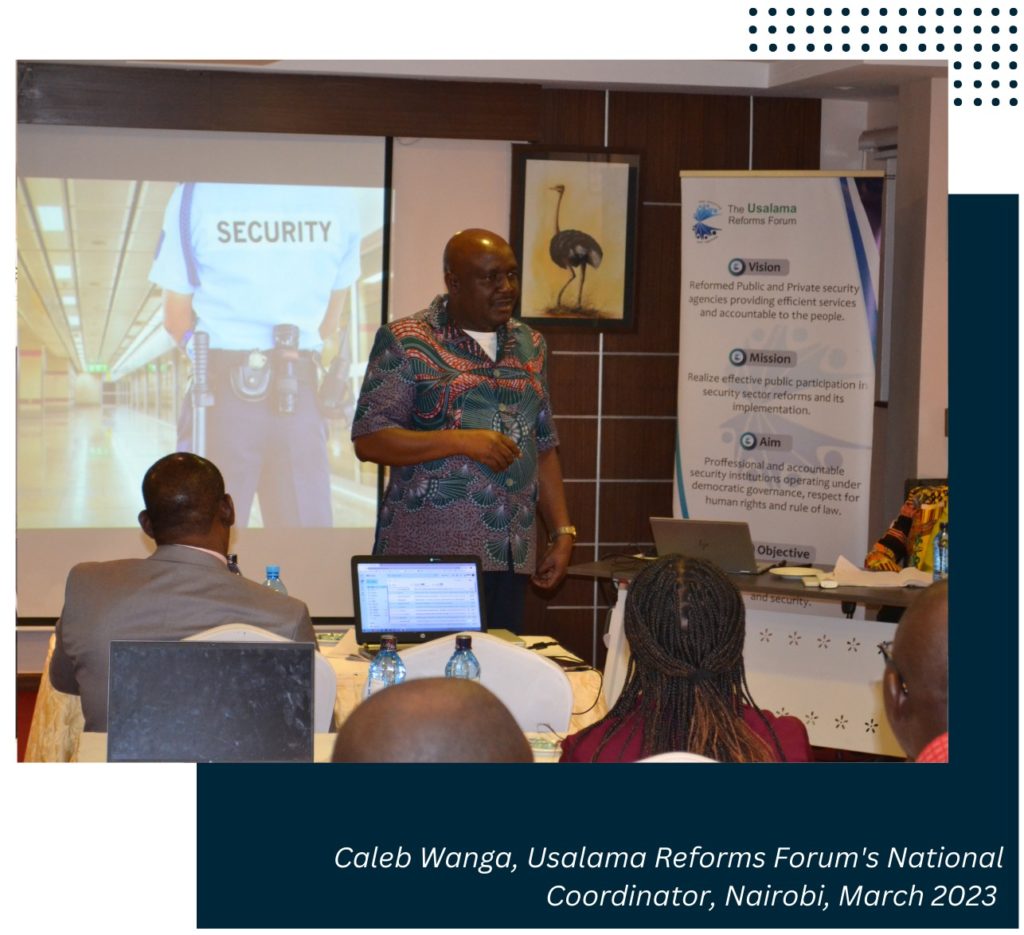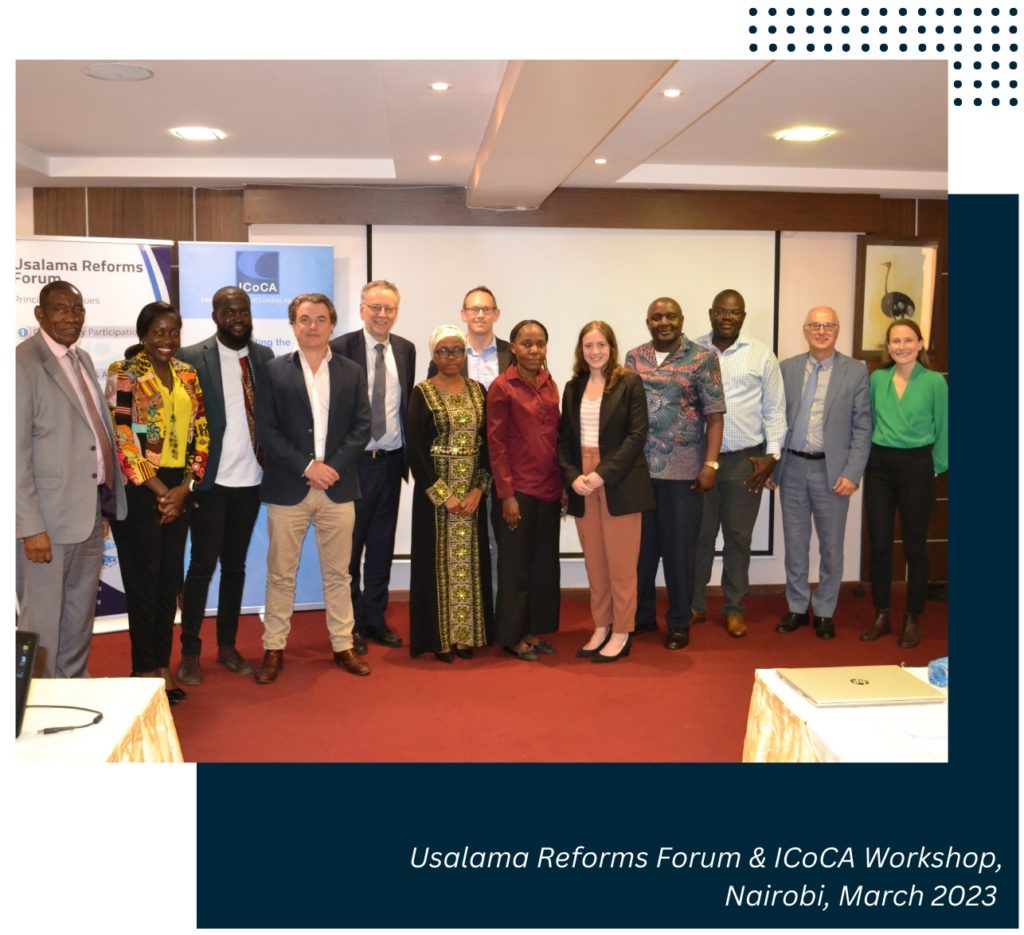USALAMA REFORMS FORUM – CSO PROFILE
Usalama Reforms Forum: Empowering Security Sector Reforms and Governance in East Africa
ICoCA CSO Member since September 2016
 Driving Positive Change through Policy Development, Partnerships, and Advocacy
Driving Positive Change through Policy Development, Partnerships, and Advocacy
Usalama Reforms Forum (Usalama) is a Kenyan-based Public Policy and Research Organisation that plays a critical role in consolidating civil society engagement in Security Sector Governance and Reform (SSG/R) in Kenya. Established through a coalition of local, national, and international organisations, “Usalama focuses on policy development, strategic partnership building, research, innovation, and community engagement, and has established itself as a key player in advocating for police reforms, accountability and professionalism, oversight mechanisms and Private Security Sector governance”, explains Caleb Wanga, Usalama’s National Coordinator. Located in Nairobi, Usalama operates in Kenya and the East Africa Region with a dedicated team of four officers and collaborations with various partners and volunteers across different communities.
The organisation focuses on a wide range of critical areas to drive positive change. These include the implementation of the UN Guiding Principles on Business and Human Rights (UNGPs), ensuring adherence to the Montreux Document on Private Military and Security Companies, promoting the International Code of Conduct for Private Security Service Providers (the Code) and the Voluntary Principles on Security and Human Rights (VPIs), and advocating for the effective implementation of the Private Security Regulations Act of 2016. Furthermore, Usalama is dedicated to harmonising the training curriculum for the private security industry in Kenya and recognises the importance of media and Civil Society Organisations (CSOs) as vital partners in the private security sector.
A Strategic Partnerships Network
Usalama has successfully built strategic partnerships with key stakeholders in the security sector, such as the National Police Service Commission (NPSC), National Police Service (NPS), the Independent Policing Oversight Authority (IPOA), Internal Affairs Unit, Geneva Centre for Security Governance (DCAF), Kenya Private Sector Alliance (KEPSA), and the Police Reforms Working Group – Kenya, among others. These partnerships enable Usalama to collaborate effectively with Government Agencies, Research Institutions, CSOs and community initiatives, national and international organisations, foundations and donor partners, to mobilise citizens’ participation in SSG/R.
Usalama is involved in building standard for private security framework in Africa and is a member of Africa Private Security Governance Observatory (PSGA), the International Code of Conduct Association (ICoCA), the Africa Coalition for Corporate Accountability (ACCA) and Outstanding Police Awards (OPSA) Steering Committee among others.
Innovative Approaches and Empowered Communities
According to Mr. Wanga, one of the distinctive aspects of Usalama’s work is its commitment to innovative approaches to programming, bringing together various partners. This is demonstrated the “Community Safety Model” developed and implemented by the organisation across Kenya, and which emphasises people-centred policing. This model incorporates democratic policing principles through community policing policies. By engaging with communities and empowering them to actively participate in ensuring their safety and security, Usalama promotes people-centred policing and strengthens the bond between the police and the public.
Usalama has also conducted a study on the state of police stations and the criminal justice system in Kenya, shedding light on the capacity of police stations to provide services. These unique approaches have helped Usalama drive meaningful change and contribute to shaping the security sector reforms agenda in the country.

A Dynamic Partnership with ICoCA
In September 2016, Usalama joined ICoCA “to strengthen civil society engagement within the private security sector governance and promote international humanitarian law and human rights compliance in the region”, says Mr. Wanga. Since then, Usalama has collaborated with ICoCA on several projects to strengthen private security sector governance and human rights compliance. These projects include:
- African Private Security Conference: Usalama hosted the African Private Security Conference in Nairobi in 2019 with support from ICoCA and DCAF. The conference provided a platform for discussions and knowledge-sharing on private security sector governance in Africa.
- Regional Mapping of Private Security Stakeholders: In 2020 Usalama, in partnership with ICoCA, conducted a regional mapping exercise in Kenya, Uganda, Tanzania, Rwanda, and South Sudan to identify and engage relevant stakeholders in the private security sector.
- Impact Assessment on Human Rights Compliance: In 2021, Usalama conducted a rapid assessment survey on the impact of human rights compliance on private security guards in Kenya during the Covid-19 pandemic. This project aimed to identify challenges and improve the working conditions of security guards.
- Media and Civil Society Advocacy: Usalama, ICoCA, and DCAF organised advocacy meetings and awareness sessions in Nairobi, Mombasa, and Kisumu in 2021 to engage media and civil society in promoting human rights compliance within the private security sector.
- Round Table Meeting on International Frameworks: In 2023, Usalama, with ICoCA’s support, conducted a round table meeting on international frameworks related to human rights compliance and the Montreux Document in collaboration with the Embassy of Switzerland in Nairobi.
Navigating Challenges and Embracing Opportunities: Enhancing Private Security Sector Governance in Kenya
The private security industry in Kenya is a significant employer, with over 2,000 service providers and approximately 500,000 employees. However, the lack of a proper regulatory environment poses a considerable challenge to its growth. To address this and ensure the sustainability of the private security industry, Mr. Wanga believes that “there is a pressing need to enhance the regulatory framework and implement interventions that ensure human rights compliance, particularly for security guards”.
According to Mr. Wanga, several challenges hinder progress, including low government participation in ICoCA’s activities globally, global security challenges such as the Russia-Ukraine conflicts, the emergence of organised criminal groups utilising advanced technology (e.g. Wagner), collapsing democratic frameworks worldwide, a dwindling global economy affecting funding opportunities and monitoring, and limited space for civil society engagement. Moreover, he thinks it is difficult to build accountability mechanisms as a lot of private security companies are not yet Members of ICoCA.
Nevertheless, Mr. Wanga believes that there are opportunities to be seized. “Increased awareness of global frameworks like ICoCA has created platforms for engagement, and the adoption of human rights standards by international contractors allows for monitoring of the private security industry’s work”, he explains. The role of private security in supporting public security is gaining recognition globally, and Mr. Wanga emphasises that strengthening public participation in international instruments, media and civil society sensitisation forums focused on the Montreux Document, the Code, and human rights compliance is crucial.
“Achieving a long-term strategy for the sustainability of private security sector governance in Kenya is vital, and can be done by targeting human rights compliance through a multi-stakeholder approach”, concludes Mr. Wanga.
To learn more about Usalama Reforms Forum, visit their website.
